Watch ISS astronauts replace a robot arm in the first spacewalk of the year
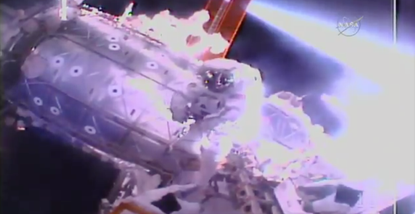

Look up. Somewhere out there — beyond the high-rises and the clouds and yes, even the airplanes — there are people. To be precise, there are two of them, and they are more than three-and-a-half hours into the first spacewalk of the year.
Astronauts Scott Tingle and Mark Vande Hei are expected to spend more than six hours Tuesday dangling off the side of the International Space Station, where they are installing a new gripper on the station's robotic arm. The mission is the ISS's 206th maintenance spacewalk since it was launched into orbit in 1998.
"This is going to be a lifetime memory for sure," Tingle told Space.com last week. "I'm looking forward to getting out there and fixing up the systems that we'll be working on."
Subscribe to The Week
Escape your echo chamber. Get the facts behind the news, plus analysis from multiple perspectives.

Sign up for The Week's Free Newsletters
From our morning news briefing to a weekly Good News Newsletter, get the best of The Week delivered directly to your inbox.
From our morning news briefing to a weekly Good News Newsletter, get the best of The Week delivered directly to your inbox.
One of the hardest parts of the spacewalk comes when Tingle has to get out of his boot restraint "and I have to go over to my partner's boot restraint, and I have to move him while he's holding a massive piece of equipment from the robotic arm, so there's a lot of mass there," Tingle said. "I think that will be tricky. I'll probably take that slow and be very cautious."
At least there is a payoff for all the trouble, Phys.org reports: "Make us proud out there," fellow Space Station astronaut Joe Acaba told Tingle and Vande Hei from inside. "We'll have hot chow for you when you get back."
Watch the spacewalk live at NASA.
Sign up for Today's Best Articles in your inbox
A free daily email with the biggest news stories of the day – and the best features from TheWeek.com
Jeva Lange was the executive editor at TheWeek.com. She formerly served as The Week's deputy editor and culture critic. She is also a contributor to Screen Slate, and her writing has appeared in The New York Daily News, The Awl, Vice, and Gothamist, among other publications. Jeva lives in New York City. Follow her on Twitter.
-
 Today's political cartoons - December 22, 2024
Today's political cartoons - December 22, 2024Cartoons Sunday's cartoons - the long and short of it, trigger finger, and more
By The Week US Published
-
 5 hilariously spirited cartoons about the spirit of Christmas
5 hilariously spirited cartoons about the spirit of ChristmasCartoons Artists take on excuses, pardons, and more
By The Week US Published
-
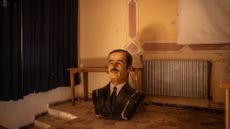 Inside the house of Assad
Inside the house of AssadThe Explainer Bashar al-Assad and his father, Hafez, ruled Syria for more than half a century but how did one family achieve and maintain power?
By The Week UK Published
-
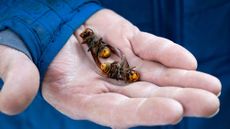 US won its war on 'murder hornets,' officials say
US won its war on 'murder hornets,' officials saySpeed Read The announcement comes five years after the hornets were first spotted in the US
By Peter Weber, The Week US Published
-
 Dark energy data suggest Einstein was right
Dark energy data suggest Einstein was rightSpeed Read Albert Einstein's 1915 theory of general relativity has been proven correct, according to data collected by the Dark Energy Spectroscopic Instrument
By Peter Weber, The Week US Published
-
 New DNA tests of Pompeii dead upend popular stories
New DNA tests of Pompeii dead upend popular storiesSpeed Read An analysis of skeletal remains reveals that some Mount Vesuvius victims have been wrongly identified
By Peter Weber, The Week US Published
-
 NASA's Europa Clipper blasts off, seeking an ocean
NASA's Europa Clipper blasts off, seeking an oceanSpeed Read The ship is headed toward Jupiter on a yearslong journey
By Peter Weber, The Week US Published
-
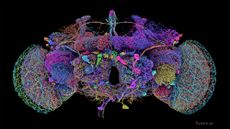 Detailed map of fly's brain holds clues to human mind
Detailed map of fly's brain holds clues to human mindSpeed Read This remarkable fruit fly brain analysis will aid in future human brain research
By Peter Weber, The Week US Published
-
 Blind people will listen to next week's total eclipse
Blind people will listen to next week's total eclipseSpeed Read While they can't see the event, they can hear it with a device that translates the sky's brightness into music
By Peter Weber, The Week US Published
-
 Melting polar ice is messing with global timekeeping
Melting polar ice is messing with global timekeepingSpeed Read Ice loss caused by climate change is slowing the Earth's rotation
By Peter Weber, The Week US Published
-
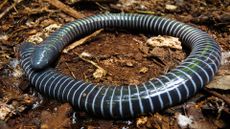 An amphibian that produces milk?
An amphibian that produces milk?speed read Caecilians, worm-like amphibians that live underground, produce a milk-like substance for their hatchlings
By Peter Weber, The Week US Published